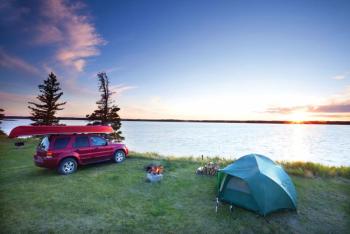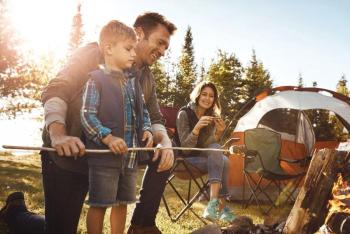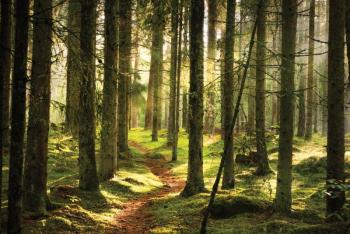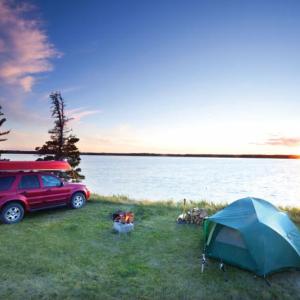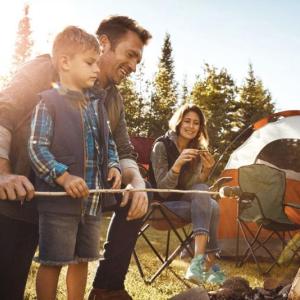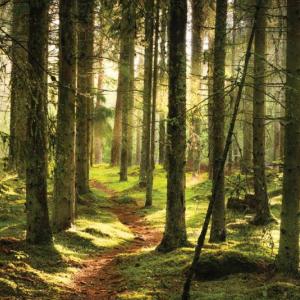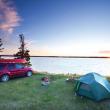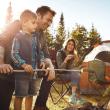Learn those 7 ‘Leave No Trace’ principles if you’re new to camping and hiking
For many long-time outdoor lovers who have been looking forward to camping and hiking this season in Maine, here’s a familiar scenario that occurred during the pandemic last summer no one ever wants to see repeated.
It’s 9 p.m. A campground is now silent, filled with darkened tents with the “Quiet Hours” rule in place, when two trucks loaded with gear come barrelling into the campsite. With truck doors repeatedly slamming over and over, tenters within a mile range have to endure the ruckus of the “Guess what! It’s our first year camping!” crowd as they set up all of their gear.
Bright spotlights shine through people’s tents as they make all kinds of noise getting their tents, canopies, camp chairs, tables, and coolers set up. A Bose speaker is now set up to jam some tunes; people speaking at the top of their lungs like it’s 2 in the afternoon, as they hang out in their own little bubble, oblivious to anyone around them.
Come five in the morning, the same group is up, more doors are slamming as the trucks idle and conversations are at the highest decibel.
Maine’s prevalent woods and waters received a crush of visitors last summer in the likes have never been seen. Despite a pandemic that mandated quarantining from the state until mid-summer, the Maine Department of Agriculture, Conservation and Forestry's (DACF) Bureau of Parks and Lands (BPL) reported that 2020 activity broke all records for recreation visits, which includes day-use and camping.
While the experiences might have been positive for many individuals new to the experience, bad practices negatively impacted the collective experiences of many. As we reported locally, back in May 2020 “Advice to heed if you don’t want to see your favorite places close down” one of the biggest negatives, according to outdoor experts, was overcrowding trails to the point of having to shut them down.
While recreating in outdoors is a new past-time for some, much of it came without proper outdoor etiquette training, known as the 7 Leave No Trace Principles.
Leave No Trace are simple, backwoods ethics showing courtesy and respect for the outdoors, wildlife, and other campers/hikers by minimizing your outdoor impact.
1. Plan Ahead and Prepare
Do: Make sure you bring everything you need for food, shelter, weather conditions, and cooking and have a designated spot to camp. Be prepared to get there early.
Don’t: Wing it, show up after hours when everyone in the campground is asleep or settled down for the night, or to a spot that doesn’t have a fire ring and make one anyway, damaging the land.
2. Travel and Camp on Durable Surfaces
Do: Stay on designated trails and sites to preserve fragile vegetation and living soil. Keep your tents, traffic routes, and kitchen on high-impact dirt and sandy areas to prevent erosion. Keep tents 200 feet from the water.
Don’t: Camp on grassy areas or hike off-trail areas, which damage the fragile ecosystem.
3. Dispose of Waste Properly
Do: Bring trash bags. Pack every scrap back out; scour the campsite to leave nothing behind. If there are no outhouse facilities, learn to dig a cat hole. Women, always pack out menstrual products.
Don’t: Leave toilet paper in the woods; bury anything that isn’t organic. Never allow a dog to foul a campsite and leave it without a thorough cleaning up.
4. Leave What You Find
Do: Minimize your campsite alterations. When you leave make it look as though no one has been there.
Don’t: Build makeshift furniture; build cairns, nail tarps to live trees; carve initials; cut boughs; collect vegetation, flowers, rocks, or other natural souvenirs.
5. Minimize Campfire Impacts
Do: Use a camp stove where possible, buy firewood locally or only gather downed firewood and kindling and build in an existing ring. Be aware of the fire danger levels in your area.
Don’t: Ever bring firewood from out of state due to invasive species of insects that can potentially damage Maine’s forests. Never burn plastic or foil in a campfire and leave it.
6. Respect Wildlife
Do: Keep a safe distance between all wild animals, big and small; take long-lens photos, but never selfies for your own safety.
Don’t: Touch, get close to, feed, or pick up wild animals as it stresses them. Never leave food out, because bears who come to rely on human food are killed as “nuisance bears.”
7. Be Considerate of Other Visitors
Do: Remember that the majority of people and long-time campers come to the outdoors for silence and solitude. If you’re in a big group, be mindful of your noise impact on nearby campers.
Don’t: Blast radios, let your pets wander, shout, slam doors, or keep other campers awake past the designated Quiet Hours.
To learn more about Leave No Trace with specific examples, visit: Center for Outdoor Ethics
Kay Stephens can be reached at news@penbaypilot.com
Event Date
Address
United States




